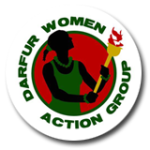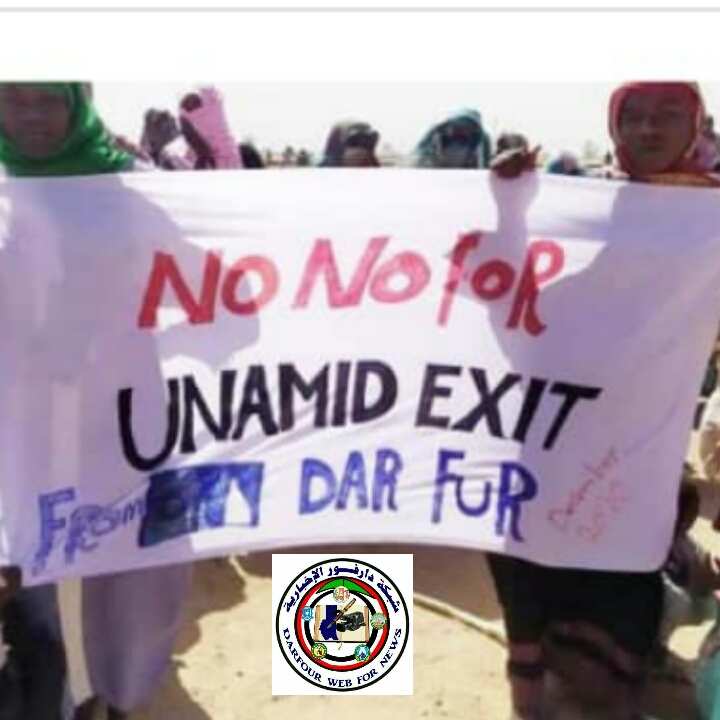Darfur Women Action Group (DWAG) is extremely concerned by the approaching exit of UNAMID and wants to bring attention to the plight of victims whose fates will be determined by their attackers. We share the concerns of IDPs and stand in solidarity with those fearful for their lives. The interim government has neither demonstrated political will nor taken steps to show the affected communities that government forces will provide them with adequate protection.
As the withdrawal of the hybrid United Nations-African Union Mission in Darfur (UNAMID) nears, overwhelming fear and outrage among displaced people have grown expeditiously. For the last two weeks, protesters at the Kalma camp in South Darfur have organized a sit-in and demanded that the UNAMID mandate not terminate on December 31. They have raised legitimate concerns about their safety and security in the absence of UNAMID and without a neutral protection force. While demonstrating in front of the UNAMID offices at the camp, protesters spoke out and opposed civilian protection responsibilities being handed over to the same Sudanese forces accused of perpetrating decades-long violence against them in Darfur. Other protests in various IDP camps have recently taken place as well, including at the Kabkabiya camp in North Darfur.
In two weeks, UNAMID is scheduled to be removed and replaced by the new UN Integrated Transition Assistance Mission in Sudan (UNITAMS). It will be stationed in Khartoum, thousands of miles away from Darfur, and it notably lacks a civilian protection mandate. This new mission is designed as a political mandate to assist Sudan’s interim government to implement its political transition process rather than protect vulnerable communities. Now with multiple ongoing crises, including a widespread COVID-19 resurgence, economic decline, mass displacement, and a huge wave of Ethiopian refugees fleeing violence, the national security of Sudan is substantially strained. It is imperative that the international community listen to the voices of the victims and assess the current situation realistically before removing independent peacekeeping troops responsible for facilitating humanitarian aid and providing limited protection for displaced Darfuris.
The international community has an obligation to protect vulnerable civilians from human rights abuses when governments fail to do so. Even in recent months, there is credible evidence that Sudanese forces have been both perpetrators and bystanders to violent attacks in Darfur, which have continued to fuel mass displacement. Between September and November this year, UNAMID reported that more than 50,000 people were displaced in Darfur due to human rights violations and conflict, including several dozen cases of sexual violence. For those who have suffered devastating attacks for nearly two decades in Darfur, it is dismaying to think that their previous attackers will soon be responsible for protecting them.
Without UNAMID peacekeepers, and lacking a clear protection plan in place for UNITAMS, the perpetuation of violence against displaced civilians and destruction in Darfur will be emboldened and exacerbate existing suffering, instability, and humanitarian crises. It will further limit the ability to report on human rights abuses and violent attacks in the region, which have been previously documented by UNAMID. This is a gravely dangerous move that may put displaced women and girls in Darfur at heightened risk of gender-based violence (GBV). The future of civilian protection and human rights enforcement in Darfur looks bleak unless effective protection is put in place.
In a place where genocide, war crimes, and crimes against humanity have occurred, and most of the accused are still at-large, it is imperative that the international community maintain this independent civilian protection mechanism until verified changes are made by the interim government of Sudan. Displaced communities are too often handed political rhetoric that rings hollow, while at the same time experiencing tactics by government forces that prolong their suffering. UN forces with a protection mandate are necessary to protect and maintain the security of displaced people and to create an environment that will allow the voluntary and safe return of IDPs and refugees in Darfur and Sudan at-large.
Therefore, DWAG calls on the UNSC and US government to listen to the voices of the victims, adequately address their concerns, and implement the following demands:
- The UNSC must include a civilian protection mandate and mechanism within the new mission.
- The UNSC and the US must press Sudan’s interim government to stop its forces from attacking innocent civilians in Darfur and across Sudan.
- The UNSC and the US must lead and rally support from member states and designate part of UNITAMS for civilian protection in Darfur.
- The UNSC and member states of the Rome Statute must pressure the interim government of Sudan to immediately surrender Omar al-Bashir, Abdul Rahim Hussein, and Ahmed Haroun to the ICC to face trial.
- The UNSC and the US must press Sudan to take serious steps to foster a safe environment for vulnerable communities who have experienced discrimination and mass atrocities.
- We urge the international community, including the US government, to pressure the interim government of Sudan to make human rights protection a matter of independent enforcement during the transition period, not empty promises for change.
- The international community and interim government of Sudan know this reality and they must not gamble with innocent lives in Darfur. There will be devastating consequences for displaced civilians if they are left to be protected by forces accused of mass rapes and systematic human rights violations.
We appeal to our supporters and followers to speak up and demand adequate civilian protection in Darfur and across Sudan. If global citizens can mobilize and demand an end to the violence and suffering in Darfur, our leaders will listen and feel compelled to take action necessary to transform these demands into sustainable and effective policies aligned with the aspirations of the people of Sudan, particularly the voices of the most vulnerable displaced Darfur civilians.
Thank you,
Niemat Ahmadi
Founder & President of DWAG





